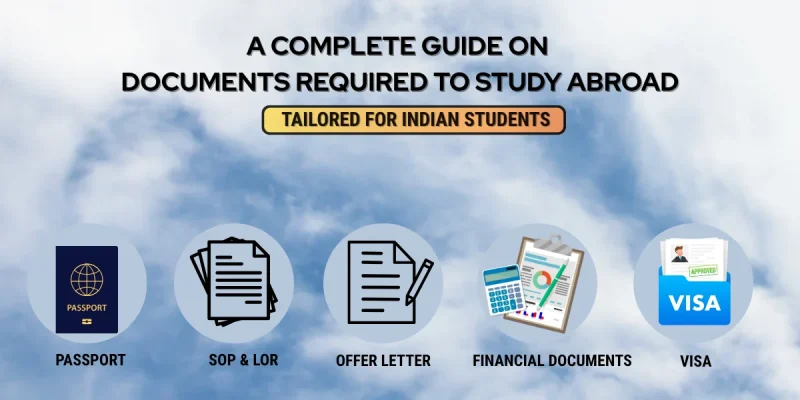Dreaming of expanding your horizons beyond your local university? Imagine immersing yourself in a new culture, learning a new language, and gaining a truly global perspective. Studying abroad isn’t just about earning a degree, it is an adventure that can transform your future. It’s a journey that pushes you out of your comfort zone and opens up a world full of exciting opportunities.
Why Studying Abroad Is a Smart Career Move
Opting for education abroad is more than just a change of scenery, it is an investment in your growth and career plan. Here’s why choosing to study abroad is a game-changer:
- Boost Your Resume: Employers love candidates with international experience. It shows you’re adaptable, independent, and globally aware.
- Master a New Language: What better way to learn than by living where the language is spoken every day?
- Gain a Global Perspective: Exposure to diverse cultures, education systems, and ideologies builds critical thinking and cross-cultural communication skills.
- Develop Life Skills: From managing your finances to navigating new cities, you’ll gain independence and resilience.
- Build Global Networks: Connect with other international students, professors, and professionals from around the world.
- Experience Personal Growth: The challenges and excitement of studying abroad help shape a stronger, more confident version of yourself.
Checklist for Choosing the Right University Abroad
1. Understand Your Academic Goals and Career Plan
Start by identifying your aspirations. Are you interested in research, innovation, or hands-on experience? Do you prefer theory-based learning or practical application? Clarify your career goals and learning preferences to find universities that match your vision.
2. Choose the Right Location
When exploring the best countries to study abroad, think beyond academics. Consider:
- Local language and culture
- Climate and lifestyle
- Safety and healthcare
- Proximity to industries or tech hubs
Whether it’s the USA, UK, Australia, or Germany—select a country where you’ll feel inspired and supported.
Also Read: Top Destinations to Study Abroad in 2025
3. Research the Best Universities in the World
Use platforms like QS World Rankings, and Times Higher Education, and find top-world universities. Look into:
- Overall and subject-specific rankings
- Accreditation and global reputation
- Student reviews and alumni testimonials
Shortlist 5–10 universities that align with your academic and career goals.
4. Dive Deep Into Course Curriculum
Don’t just focus on a university’s name analyze the actual course content. Check for:
- Core modules and electives
- Internship and research opportunities
- Teaching methods (online, hybrid, or in-person)
- Faculty credentials
This ensures the course supports your career plan and skill development.
Also Read: How to Choose the Right Course for Study Abroad in 2025
5. Student Life and Campus Culture
University life goes beyond academics. Look for vibrant campus cultures with:
- Student clubs and societies
- Events and festivals
- Sports and wellness facilities
- Support for international students
A well-rounded campus experience is crucial for your mental well-being and personal growth.
6. Understand Tuition Fees and Living Costs
Education costs vary depending on the country and institution. Factor in:
- Tuition and student activity fees
- Rent, food, transport, and utilities
- Health insurance and visa expenses
For example, while Germany offers low or no tuition fees, living costs in cities like Berlin can be high.
7. Set a Realistic Budget
Create a detailed budget that includes:
- Family support
- Savings
- Part-time job opportunities
- Emergency funds
Compare your budget with the estimated cost of living, student accommodation, and tuition in your shortlisted universities.
8. Explore Scholarships and Financial Aid
Don’t let finances limit your dreams. Search for:
- Government-funded education abroad scholarships
- University-specific scholarships
- Scholarships for students abroad from external organizations
Apply early, meet all requirements, and don’t miss out on any funding opportunities.
9. Understand Visa and Immigration Requirements
Each country has different visa protocols. Check:
- Visa categories and work rights
- Financial documentation
- Part-time work permissions
- Post-study work options
These rules affect your ability to work, earn, and stay after graduation.
10. Prepare for Admissions and Applications
Every university has its own admission process. Prepare:
- Academic transcripts
- Language proficiency tests (IELTS, TOEFL)
- SOPs, LORs, and resume
- Application and scholarship deadlines
Getting expert help from education abroad consultants can ease the entire process.
11. Explore Post-Study Opportunities
Your destination should also offer good post-graduation prospects. Look into:
- Job market and industry demand
- Work permits and stay-back options
- Career counseling and placement support
- Alumni employment records
Countries like Australia, and Germany are known for generous study abroad post-study work rights.
12. Check Internship and Job Opportunities
Investigate the employability potential:
- Availability of internships during your course
- Connections with industries and companies
- Placement support and average starting salaries
Choose a university that offers strong industry ties in your field of study.
13. Consult Study Abroad Experts
When in doubt, reach out to experts. Education abroad consultants like Innvictis Edutech can help with:
- University shortlisting
- Application and document support
- Study abroad scholarships guidance
- Visa filing and pre-departure orientation
A trusted study abroad consultant will guide you every step of the way.
14. Make Your Final Decision
Review your research, compare pros and cons, talk to alumni or counselors, and trust your instincts. Choose the university that aligns best with your academic ambitions, budget, and lifestyle preferences.
Final Thoughts: Your Global Journey Starts Now
Studying abroad is a life-changing decision. It offers more than academic excellence; it’s your gateway to global experiences, personal growth, and a successful career. Whether you’re drawn to the best universities in the world or simply seeking the top countries to study abroad, the path begins with one brave step. So go ahead, plan wisely, dream boldly, and get ready to unlock your future on an international stage.
FAQs
What’s the first step in planning to study abroad?
Begin by defining your academic interests and long-term career plan. This helps narrow down your choices and find the right program.
How important is the country or city when studying abroad?
Very. Your experience as an international student is shaped by the location’s culture, safety, opportunities, and cost of living.
Should I rely only on university rankings?
No. While rankings help, also check course content, faculty, student support, and reviews to find the best fit.
How do I ensure the course matches my goals?
Study the curriculum in detail. Ensure it includes practical exposure, electives you’re interested in, and job-ready training.
What financial factors should I consider?
Research tuition, and living expenses, and explore study abroad scholarships and financial aid early. Budget smartly and check work options abroad.














